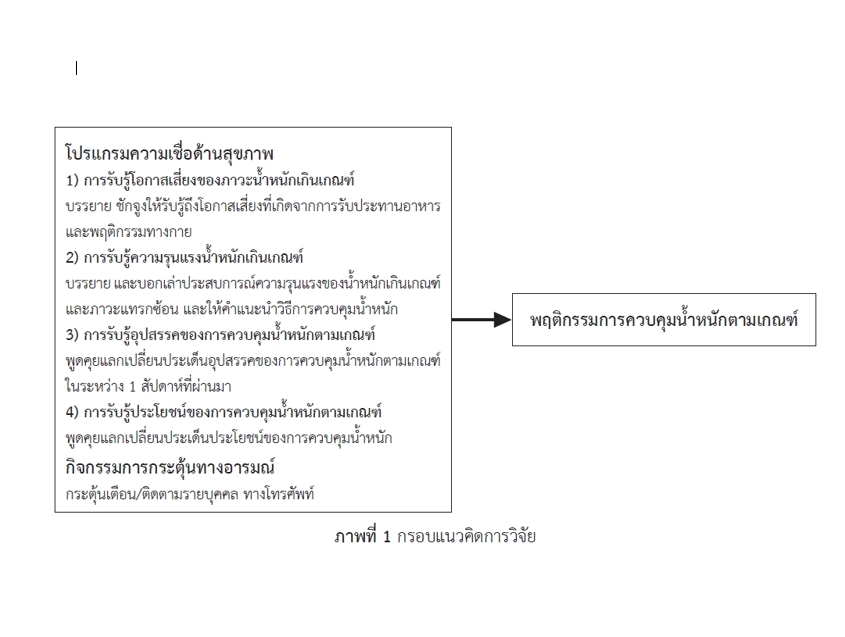ผลของโปรแกรมความเชื่อด้านสุขภาพต่อพฤติกรรมการควบคุมน้ำหนัก ของสตรีตั้งครรภ์ที่มาฝากครรภ์โรงพยาบาลสูงเนิน จังหวัดนครราชสีมา
คำสำคัญ:
โปรแกรมความเชื่อด้านสุขภาพ, การควบคุมน้ำหนัก, สตรีตั้งครรภ์บทคัดย่อ
การศึกษานี้เป็นการวิจัยกึ่งทดลองชนิดกลุ่มเดียวเปรียบเทียบก่อนหลังการทดลอง เพื่อศึกษา ผลของโปรแกรมความเชื่อด้านสุขภาพต่อพฤติกรรมการควบคุมน้ำหนักตามเกณฑ์ของสตรีตั้งครรภ์ที่มาฝากครรภ์โรงพยาบาลสูงเนิน จังหวัดนครราชสีมา กลุ่มตัวอย่าง คือ สตรีตั้งครรภ์ที่มีอายุระหว่าง 15-34 ปี ที่มารับบริการ ณ คลินิกฝากครรภ์โรงพยาบาลสูงเนิน ใช้วิธีการเลือกกลุ่มตัวอย่างแบบเจาะจง (Purposive Sampling) จำนวน 30 ราย เครื่องมือที่ใช้ในการดำเนินการวิจัย คือ โปรแกรมความเชื่อด้านสุขภาพต่อพฤติกรรมการควบคุมน้ำหนักตามเกณฑ์ของสตรีตั้งครรภ์ และเก็บรวบรวมข้อมูลโดยใช้แบบสอบถามพฤติกรรมการควบคุมน้ำหนัก ค่าสัมประสิทธิ์แอลฟาครอนบาค เท่ากับ 0.83 วิเคราะห์ข้อมูลโดยใช้สถิติพรรณนา และสถิติเปรียบเทียบ Wilcoxon signed rank test
ผลการศึกษาพบว่าสตรีตั้งครรภ์ภายหลังเข้าร่วมโปรแกรมความเชื่อด้านสุขภาพมีคะแนนพฤติกรรมการควบคุมน้ำหนักตามเกณฑ์สูงกว่าก่อนการทดลอง อย่างมีนัยสำคัญทางสถิติ ที่ระดับ .05
ผลการวิจัยเสนอแนะว่าพยาบาลวิชาชีพที่แผนกฝากครรภ์สามารถใช้โปรแกรมความเชื่อด้านสุขภาพต่อพฤติกรรมการควบคุมน้ำหนักตามเกณฑ์ของสตรีตั้งครรภ์ไปประยุกต์ใช้ในการปรับเปลี่ยนพฤติกรรมของสตรีตั้งครรภ์ที่มารับบริการ ณ คลินิกฝากครรภ์
เอกสารอ้างอิง
Abdolaliyan, N., Shahnazi, H., Kzemi, A., & Hasanzadeh, A. (2017). Determinants of the self-efficacy of physical activity for maintaining weight during pregnancy: The application of the health belief model. Journal of Education and Health Promotion, 6(1), 93. https://doi.org/10.4103/jehp.jehp_175_16
Asad-Dehghan, M., Chaiperm, T., Phatihattakorn, C., Boriboonhirunsarn, D., Pintlertsakun, O., & Chuprakonh, A. (2022). Physical activity in low-risk pregnant women in Siriraj Hospital. Siriraj Medical Bulletin, 15(4), 228-237. [In Thai]
Becker, M. H. (1974). The health belief model and preventive health behavior. Health Education Monographs, 2(4), 354-385.
Banafshe, E., Javadifar, N., Abbaspoor, Z., Karandish, M., & Ghanbari, S. (2024). Factors influencing weight management in pregnant women with overweight or obesity: A meta-synthesis of qualitative studies. Journal of The Academy of Nutrition and Dietetics, 124(8), 964-993.
Chen, C., Xu, X., & Yan, Y. (2018). Estimated global overweight and obesity burden in pregnant women based on panel data model. PloS One, 13(9), e0202183.
Diddana, T. Z., Kelkay, G. N., Dola, A. N., & Sadore, A. A. (2018). Effect of nutrition education based on health belief model on nutritional knowledge and dietary practice of pregnant women in Dessie Town, Northeast Ethiopia: A cluster randomized control trial. Journal of Nutrition and Metabolism, 2018(1), 1-10. https://doi.org/10.1155/2018/6731815
Driscoll, A. K., & Gregory, E. (2020). Increases in pre-pregnancy obesity: United States, 2016-2019. NCHS Data Brief, 1(392), 1-8.
Faul, F., Erdfelder, E., Lang, G. A., & Buchner, A. (2007). G*Power 3: A flexible statistical power analysis program for the social, behavioral, and biomedical sciences. Behavior Research Methods, 39(2), 175-191.
Gettong, N., & Rujiraprasert, N. (2018). The relationships between knowledge about overweight during pregnancy, perceived self-efficacy and health behavior among pregnant women with overweight. Srinagarin Medical Journal, 33(2), 129-135.
Gojuntak, R., Suppaseemanont, W., & Sangin, S. (2017). Effects of a perceived self-efficacy in nutrition enhancement program on nutrition health behavior and weight gain of primigravida pregnant women with pre-pregnancy overweight. Nursing Journal of the Ministry of Public Health, 27(3), 80-90. [In Thai]
Jaiyod, N., & Manoton, A. (2023). Effectiveness of applying the concept of health belief model in modifying obesity reduction behavior of Sukhothai personnel, Muang district, Sukhothai province. Academic Journal of Community Public Health, 9(1), 54-68.
Jangsavang, S., Siriarunrat, S., & Tachasuksri, T. (2020). Factors predicting blood glucose control behavior among pregnant women with gestational diabetes mellitus. The Journal of Faculty of Nursing Burapha University, 28(3), 79-89. [In Thai]
Karabutr, T., Tachasuksri, T., & Siriarunrat, S. (2022). The effects of a self-management program on weight control behaviors and appropriate weight gain among overweight and obese pregnant women. The Southern College Network Journal of Nursing and Public Health, 9(2), 40-53. [In Thai]
Ledoux, T., Daundasekara, S., Van Den Berg, P., Leung, P., Walker, L., & Berens, P. D. (2018). Association between health beliefs and gestational weight gain. Journal of Women’s Health, 27(3), 341-347.
Lemeshow, S., Hosmer Jr., D. W., Klar, J., & Lwanga, S. K. (1990). Adequacy of sample size in health studies. John Wiley & Sons Ltd.
Parrettini, S., Caroli, A., & Torlone, E. (2020). Nutrition and metabolic adaptations in physiological and complicated pregnancy: Focus on obesity and gestational diabetes. Frontiers in Endocrinology, 11, article 611929.
Pinitlertsakun, O., & Wayuhuerd, S. (2021). Overweight and obesity in pregnant women: The challenging roles of nurses and midwives. Journal of Nursing and Health Care, 39(1), 29-38.
Pongcharoen, T., Gowachirapant, S., Wecharak, P., Sangket, N., & Winichagoon, P. (2016). Pre-pregnancy body mass index and gestational weight gain in Thai pregnant women as risks for low birth weight and macrosomia. Asia Pacific Journal of Clinical Nutrition, 25(4), 810-817. [In Thai]
Pornsaen, S., & Hankla, S. (2021). The VDO media using to promote food consumption behavior of pregnant women in ANC clinic, Kumphawapi Hospital, Udon Thani Province. Mahasarakham Hospital Journal, 18(2), 97-104. [In Thai]
Rattasumpun, S. (2018). Obesity in pregnant women: Health impacts and nursing care. Songklanagarind Journal of Nursing, 38(1), 120-128. [In Thai]
Rong, K., Yu, K., Han, X., Szeto, I. M., Qin, X., Wang, J., ..., & Ma, D. (2015). Pre-pregnancy BMI, gestational weight gain and postpartum weight retention: A meta-analysis of observational studies. Public Health Nutrition, 18(12), 2172-2182.
Satarak, P., Oangkanawin, P., & Prachasaisoradej, K. (2019). Guidelines for weight control behaviors during pregnancy in women with an over pre-pregnancy body mass index. Nursing Journal of the Ministry of Public Health, 29(3), 171-178.
Simon, C., Evans, L., Pearce, J., & Ellis, S. (2022). Overweight, obesity and excessive weight gain in pregnancy as risk factors for adverse pregnancy outcomes: A narrative review. Journal of Human Nutrition and Dietetics, 35, 250-264.
Sulakkananurak, C., & Tasing, O. (2021). Factors affecting successful weight loss among obese persons. Journal of Health Science, 30(4), 614-622. [In Thai]
Sunsaneevithayakul, P., Titapant, V., Ruangvutilert, P., Sutantawibul, A., Phatihattakorn, C., Wataganara, T., & Talungchit, P. (2014). Relation between gestational weight gain and pregnancy outcomes. Journal of Obstetrics and Gynecology Research, 40(4), 995-1001. [In Thai]
Younes, A. M., & Mohammed, Z. J. (2023). Assessment of health beliefs regarding weight control among overweight and obese pregnant women: Applying health belief model. Bahrain Medical Bulletin, 45(4), 1731-1733.

ดาวน์โหลด
เผยแพร่แล้ว
รูปแบบการอ้างอิง
ฉบับ
ประเภทบทความ
สัญญาอนุญาต

อนุญาตภายใต้เงื่อนไข Creative Commons Attribution-NonCommercial-NoDerivatives 4.0 International License.




